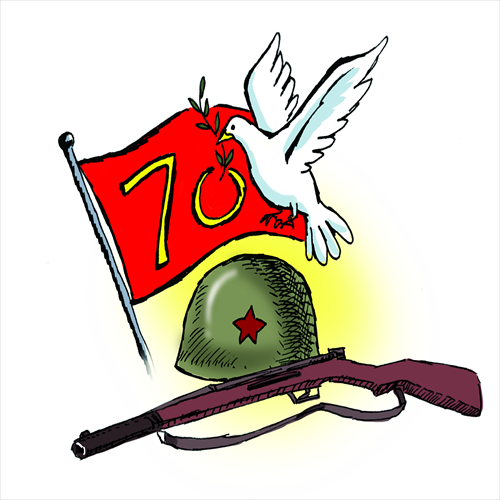Parade to highlight China’s WWII sacrifice

Illustration: Liu Rui/GT
China will, for the first time, hold a military parade to commemorate the victory of China's War of Resistance against Japanese Aggression and the World Anti-Fascist War. The West tends to perceive the parade from the perspectives of realpolitik and international relations. They believe that China will use the parade as a chance to showcase itself as a rising power and to advocate the corresponding international status. They also argue that China will use historical issues as a tool to contend with Japan. Some sinologists even say that China is taking advantage of history to consolidate the legitimacy of the ruling party.
These analyses are all reasonable to some extent. But for China, the parade is more about demanding justice for history and showing China's determination in safeguarding the postwar international order.
China, as a victorious nation, made huge contributions and sacrifices in WWII. However, the role of China in the war has long been marginalized in Western historical discourse and as a result, China's status has not received due acknowledgment. Therefore, the first purpose of the parade is to remind the world of China's status as a victorious nation which came at a huge cost.
In addition, China's contribution to WWII is quite unique in that it saved not only China itself, but also the whole of human civilization. Without any help from other nations, China was fighting alone against fascist Japan for as long as four years, from 1937 to the outbreak of the Pacific War.
We can imagine what might have happened if China had chosen to surrender when facing a powerful Japan. Japan, after seizing China's abundant resources, would have definitely formed an alliance with Germany to invade the Soviet Union. Facing a converging attack from both Japan and Germany, the Soviet Union would find it hard to survive. Then the US would have been left alone to counter fascism. But is it possible that the US could conquer the Axis powers if the Soviet Union were defeated?
It was the tenacious resistance from China, which did not give up even in the most difficult times, that created opportunities for the world to defeat fascism. However, China's unique and huge contribution has not been acknowledged in Western historical circles.
Rana Mitter, professor of History and Politics of Modern China at the University of Oxford, has pointed out many times that Westerners know little about China's War of Resistance against Japanese Aggression (1937-45), and that China has been ignored and even received unfair treatment. Mitter says that the most outstanding contribution China made to WWII was its tenacious resistance.
The establishment of the postwar international order is an important reason for the world to maintain peace for as long as 70 years after 1945. However, stepping into the 21st century, Japan is increasingly influenced by a right-wing mentality and tends to negate the history of WWII.
Japanese Prime Minister Shinzo Abe, after taking office, has even openly challenged the Potsdam Declaration. He denied the Article 6 of the declaration, which reads "There must be eliminated for all time the authority and influence of those who have deceived and misled the people of Japan into embarking on world conquest."
Abe argued that the declaration was just an official document that reflects the political standing of the Allies and that accepting the declaration was just a way for Japan to end the war. He regards Class A war criminals as heroes. In addition, Abe, regardless of opposition from citizens and constitutional scholars, violates Article 9 of the pacifist Constitution and strives to ram through new security bills.
Obviously, safeguarding the postwar international order has become one of the most important and urgent needs to safeguard world peace. China's first non-National Day military parade is not only to emphasize its historical contribution, but also to promote global progressive forces, especially the Allies which have made huge contributions to the postwar order, to jointly safeguard the hard-won peace.
The author is a scholar residing in France and a research fellow from the Sinolizing Research Center. opinion@globaltimes.com.cn